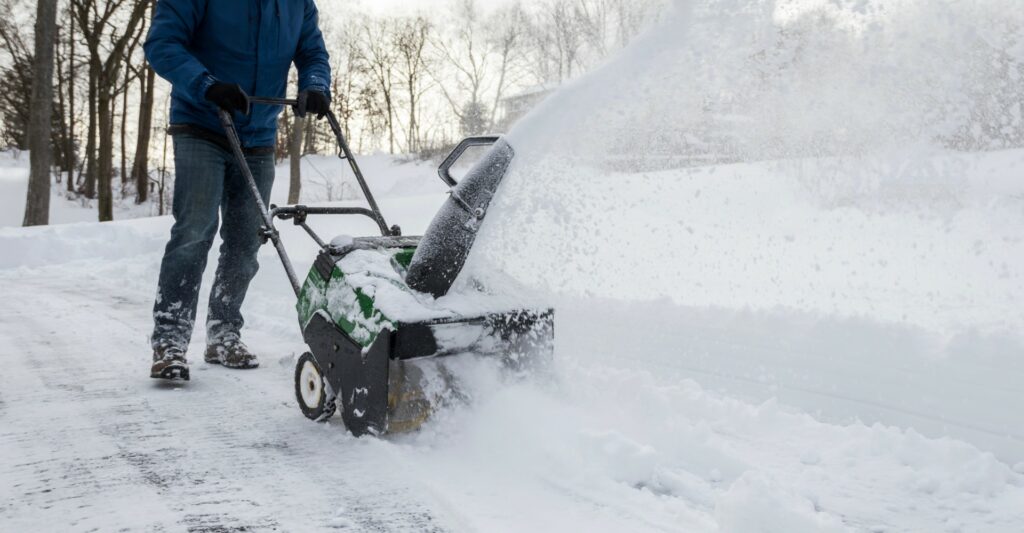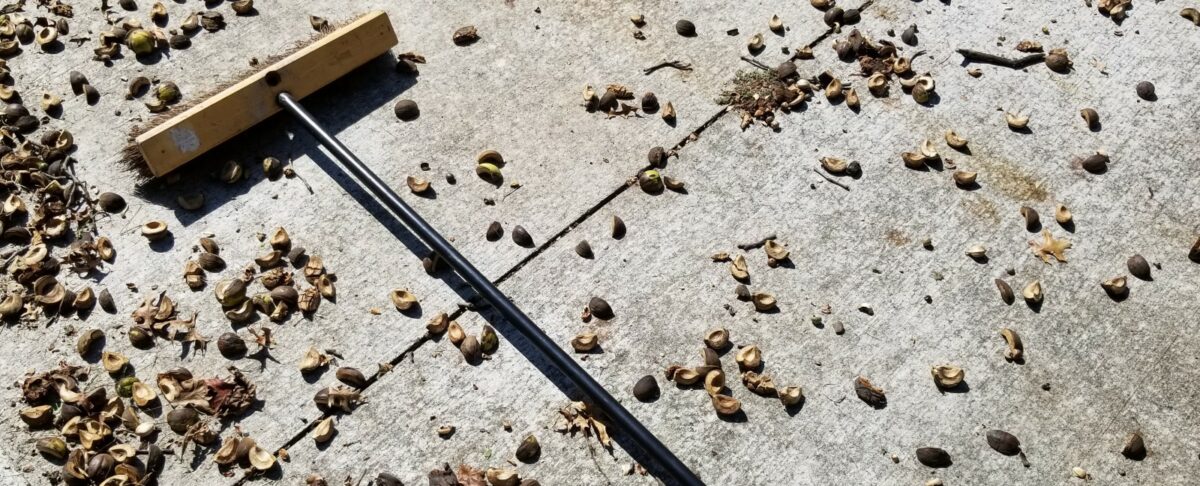Few things have the power to dial back the aesthetic appeal and overall functionality of the average Midwestern home more quickly than a driveway in need of repair or replacing. Generally tougher than their asphalt counterparts, durable concrete driveways are the first choice of many Midwestern homeowners. They boast an attractive appearance, superior longevity, and overall strength and sturdiness.
Proper maintenance and care of your concrete driveway will help ensure that it remains in top condition for years to come.Each season in the Midwest comes with different weather conditions and maintenance requirements. Read on to learn what you need to know about seasonal care for your concrete driveway.
Spring Maintenance for Concrete Driveways
The first step in your spring concrete driveway maintenance strategy should be to thoroughly sweep the surface area free of all materials such as:
- Dirt
- Dust
- Debris
- Fallen leaves
- Twigs
Check the surface of the driveway carefully for moss, algae, or lichen. These organisms make paved surfaces slick and slippery, and allowing them to continue to grow unchecked may result in premature pitting and cracks. Carefully remove these organisms by using over-the-counter products designed to be safe and effective. Avoid using products with harsh chemical compositions because they can damage the concrete and lead you to need a total concrete driveway replacement.
Clean and Repair
The next step is to gently but thoroughly clean the entire surface of the driveway. At the same time, be sure to carefully inspect it for any emerging cracks, pits, or other structural issues. Having these repaired while in the beginning stage is far less expensive than waiting until they have grown large enough to pose safety risks and seriously damage the aesthetics of your property.
Spring is the ideal time to have necessary professional repairs performed on your concrete driveway. Winter weather in the Midwest can be rough on paved surfaces of all types. Ice and snow can penetrate small pits and cracks, making them grow larger, and the temperature fluctuations can cause surface ice to expand and contract. These faults often become apparent when the weather gets warmer in spring.
Seal Driveways
You should also seal concrete driveways approximately once every four to five years, and spring is a fantastic time to complete this task. Professional sealing helps concrete surfaces last longer by protecting them from the elements and the demands of heavy traffic.
Concrete Driveway Maintenance in Summer
As spring transitions into summer, give your concrete driveway one last good inspection for any kind of cracks, fissures, or pits. Midwest summer temperatures can be quite warm, and this can contribute to the growth of these issues. Here’s what else you should do in summer to keep your driveway looking and performing its best:
Give It a Thorough Cleaning
It’s probably been a couple of months since your driveway received its annual spring cleaning, so go ahead and clean it again at some point during the start of summer. Using a power washer will get it as clean as possible.
Be Mindful of Sharp Objects
If you’re like most Midwestern homeowners, you take pride in your yard and garden area — and this means you’ll be doing lots of outdoor chores during the summer. Lawnmowers, edgers, and various gardening tools have sharp edges, so use caution when using these items on landscaping near the driveway. While moving your lawn mower from one part of your property to another, be sure to put the blade on its highest setting to avoid inadvertently damaging the concrete.
Fortunately, concrete is more difficult to damage with sharp objects than asphalt, but practicing caution is nonetheless advised.
Introduce Some Shade
A shade sail or optimal placement of a nearby shade tree can help prolong the life of your concrete driveway by shielding the surface from harmful UV rays. However, make sure to check with professionals before you plant, as trees with spreading root systems may pose a risk to the structural stability of nearby paved surfaces as they grow and mature. As a general rule of thumb, most evergreens have taproots that grow straight down, while their deciduous counterparts have fibrous root systems that tend to spread out.
Autumn Care Tips for Concrete Driveways
Autumn outdoor chores will naturally involve a lot of leaf removal, and some of this activity will likely include your driveway. Using a leaf blower on paved surfaces is recommended instead of using a rake, to prevent possible damage from the rake’s teeth. Other autumn maintenance considerations for your concrete driveway include the following:
Check Your Downspouts
Early autumn is a great time to check your downspouts to ensure they aren’t draining onto any of your outdoor paved surfaces. Clean out your drain pipes to ensure they reroute water onto your grass, not your driveway.
Relocate Shrubs or Trees
Autumn is also an excellent time to relocate any shrubs or young trees with spreading root systems that may have been planted too close to your driveway. If these root systems don’t get moved, they can cause significant damage to your driveway.
Edge the Sides of the Driveway
Take time to edge the grass and landscaping along your driveway in autumn. Edging the sides of your driveway will create small grooves that provide precipitation runoff with somewhere to go.

Winter Maintenance Recommendations for Concrete Driveways
It’s no surprise that Midwest winters can involve significant snow and ice. Here’s what you need to know about keeping your driveway in top shape during this season:
Remove Snow and Ice Regularly
The best practice is to remove snow and ice after the most recent snowfall, but be mindful of the kind of shovel you use. Metal shovels have sharp edges that may damage concrete if brought into consistent contact with it. Plastic shovels are better, but consider using large heating mats explicitly designed for use on concrete residential driveways if you want to avoid shoveling altogether.
Avoid Parking Your RV on Your Concrete Driveway
Most people only use their RVs during certain times of the year and leave them parked for the winter. Parking for long periods of time on the average residential driveway can weaken the surface. Although concrete holds up better to excess weight than asphalt, it’s still best to store your RV on a designated RV pad for the winter.
Clean Spills Promptly
No matter what time of year, the removal of automotive fluid spills from the surface of your driveway should be an essential part of your concrete driveway care plan. These stains can permanently discolor your driveway as well as weaken the concrete.
Create a Seasonal Maintenance Plan For a Long-Lasting Driveway
Concrete driveways are attractive and durable during every season. With the proper care, your concrete driveway should last over 25 years. Be sure to follow the tips outlined in this article and remain consistent with seasonal maintenance each year. Please feel free to contact Richfield Concrete for more information on seasonal home driveway care and to create a personalized maintenance plan that will keep your driveway in top condition.





